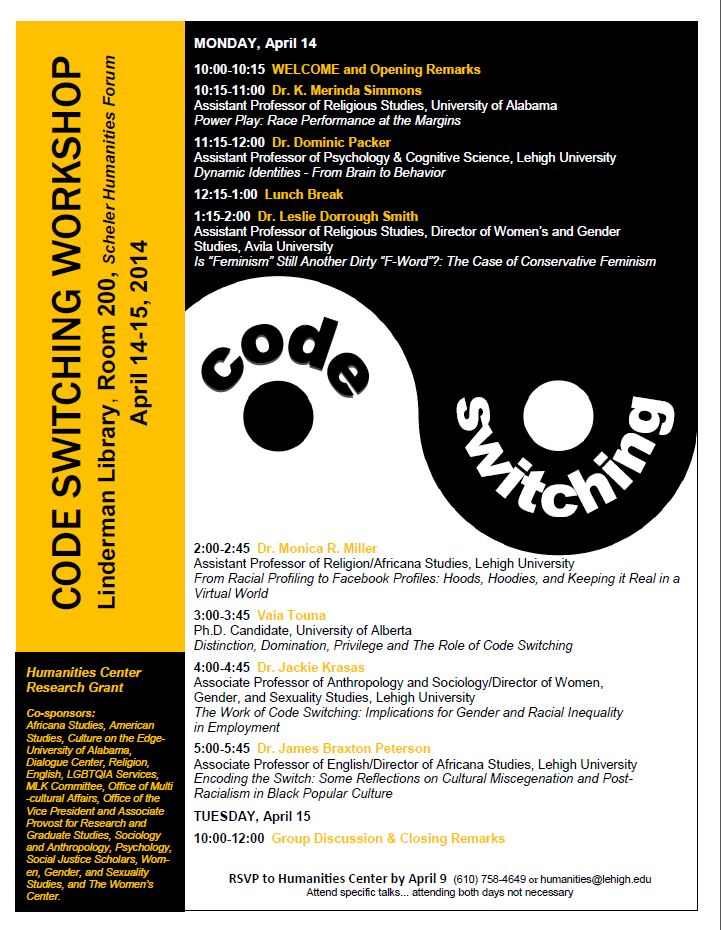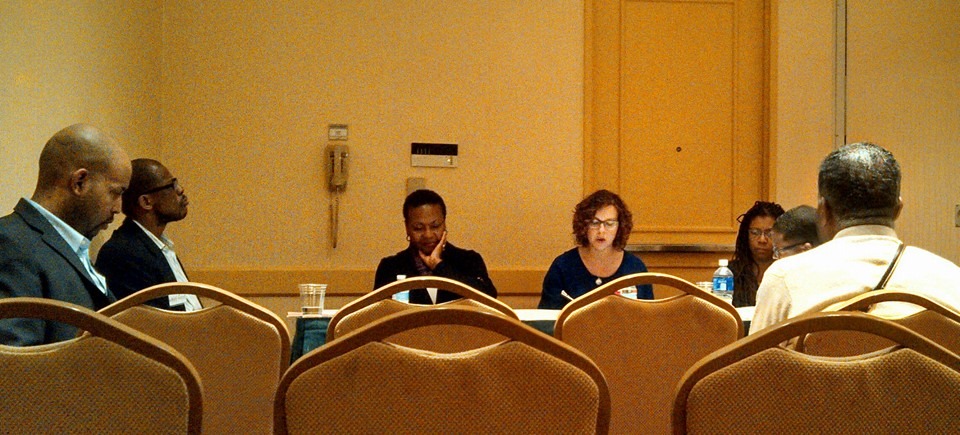 You’re welcome.
You’re welcome.
@idendefying


A Peer Reviewed Blog
Nota Bene provides citations and brief descriptions of other work carried out by the members of Culture on the Edge.
 You’re welcome.
You’re welcome.
@idendefying

 But is this code switching?
But is this code switching?
You’ll learn more at Lehigh University when
the Edge comes to town in a few weeks.
 Good question, Shannon.
Good question, Shannon.

One can measure very neatly the white American’s distance from his conscience—from himself—by observing the distance between White America and Black America. One has only to ask oneself who established this distance, who is this distance designed to protect, and from what is this distance designed to offer protection?
-James Baldwin, 19655I’m shocked, too.
I’m supposed to be locked up, too.
You escape what I’ve escaped…
You’d be in Paris getting f***ed up, too.
-Jay Z, 20116
Monica Miller has recently been award a Lehigh University Faculty Research Grant (Research and Graduate Studies) to conduct fieldwork on the topic of “K(no)w Where to Go: Diasporic Transatlantic Commuters and Escaping the Permanence of “American” Racism” which explores the social, cultural, economic and geographic options of African American expatriates living in Europe – a part of a larger book project she’s working on entitled, New Black Godz: Distinct Bodies, Religions of Distinction. Continue reading ““K(no)w Where to Go””
 The latest Code Switching Workshop flyer now has the workshop program listed on it, so be sure to take a look! Also keep an eye out for live updates on our twitter feed @idendefying
The latest Code Switching Workshop flyer now has the workshop program listed on it, so be sure to take a look! Also keep an eye out for live updates on our twitter feed @idendefying
(Click on the image to see a larger version.)
 In December 2013, Steven Ramey was interviewed by Russell McCutcheon so he could discuss the development of his research and how his focus has shifted over the course of the past few years — as McCutcheon writes in his piece for The Religious Studies Podcast — “from inter-religious cooperation to diaspora religion” to “a far broader interest not only in social theory but in the practical implications of categorization for creating identities.”
In December 2013, Steven Ramey was interviewed by Russell McCutcheon so he could discuss the development of his research and how his focus has shifted over the course of the past few years — as McCutcheon writes in his piece for The Religious Studies Podcast — “from inter-religious cooperation to diaspora religion” to “a far broader interest not only in social theory but in the practical implications of categorization for creating identities.”
Give the interview a listen…
This podcast originally appeared on the blog for The Religious Studies Project.
On Tuesday, 4 March 2014, Leslie Dorrough Smith (Avila University) hosted Monica Miller (Lehigh University) for a class discussion entitled “Why Be An Earth When You Can Be a God: Hip Hop, Religion, and Gender”, with an upper level gender course at Avila University (Kansas City, MO), and a public lecture entitled “Why Be An Earth When You Can Be a God: Hip Hop, Religion, and Gender” later that evening. The public lecture was on the lyrical imagination of emcees and Hip Hop artists alike has long focused on what some have called a “God Complex,” where such artists often refer to themselves as deities. This talk explores the changing dimensions and historical roots of Hip Hop’s “God Complex,” analyzes the rhetoric that positions “gods” as men (leaving women as representatives of “earth”), and considers what role gender and identity politics play in such an evolution.
(Click here to learn more.)
 The Edge’s Merinda Simmons, pictured above (center, middle right), presents her book response at the 2014 Regional AAR, addressing notions of identity and authenticity. Learn more here… Continue reading “The Edge at the Southeastern AAR”
The Edge’s Merinda Simmons, pictured above (center, middle right), presents her book response at the 2014 Regional AAR, addressing notions of identity and authenticity. Learn more here… Continue reading “The Edge at the Southeastern AAR”
 The Edge is now on Twitter!
The Edge is now on Twitter!
Be sure to follow us to see posts, news updates, and more from the members here at the Edge. Be sure to spread the word!